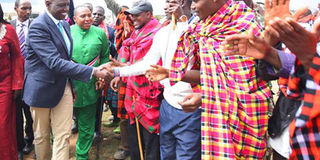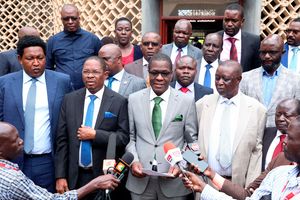BBI report opens fresh Ruto, Raila battlefront

Deputy President William Ruto is welcomed to Ewaso Ngiro, Narok County, on November 29, 2019 for a thanksgiving ceremony for nominated MP David Sankok. He has differed with Raila Odinga on how the BBI report should be enforced. PHOTO | PSCU
What you need to know:
- Closer interrogation in the coming weeks might reveal that with a cautious approach seemingly designed not to ruffle feathers, the BBI team came up with a sterile report.
- After the mutual backslapping, reality will begin to dawn that the BBI report identifies many of the national problems, but skirts the issue of concrete proposals.
The launch of the Building Bridges Initiative task force report at the Bomas of Kenya was largely seen as a success and an opportunity for feuding political factions to put on displays of amity.
The image of President Uhuru Kenyatta, Deputy President William Ruto and opposition leader Raila Odinga linking hands on the podium, and their separate speeches lauding the initiative, might suggest clear passage when it comes to implementation.
However, the public show of unity masked the clear undercurrents, which could come to the fore in the coming weeks if political tussles resume.
Failure by the task force chaired led by Senator Yusuf Haji and Dr Adams Oloo to provide a clear implementation matrix and specific proposals on constitutional and statute law amendments is already providing some early flashpoints.
The entourages had hardly left the Bomas amphitheatre when clear signs of division started being played out as supporters of DP Ruto and Mr Odinga started early skirmishing on how the recommendations would be implemented, specifically on the role of Parliament versus a ‘people-driven’ process.
DP Ruto — leader of the powerful Tangatanga faction in the Jubilee Party opposed to the BBI championed by President Kenyatta and Mr Odinga — was effusive in his praise of the outcome.
CHOREOGRAPHED EVENT
At Bomas and the previous day at State House when the report was officially handed over to the President, he was unstinting in support of BBI, lauding President Kenyatta and Mr Odinga for their vision and patriotism.
But he was also very careful in his choice of words, with keen listeners likely to see his promised support as conditional on his demands for an inclusive, open and honest process that listened to all points of view.
If DP Ruto was careful and diplomatic in his choice of words, his lieutenants were more forthright in voicing unhappiness and pressing demands.
At Bomas, Senate Majority Leader Kipchumba Murkomen nearly spoilt the party in speaking out forcefully against what he felt was a stage-managed function designed to deny a voice to those who had in the past expressed misgivings on BBI, essentially the Deputy President’s faction.
That he was nearly booed off the podium but stood firm despite the hostility only served to justify his complaints against a choreographed event.
Even at the much smaller State House function, it had been evident that the guest list of politicians was dominated by those openly supportive of BBI.
This brought parallels with President Kenyatta’s meeting with central Kenya leaders a week earlier at the Sagana State Lodge.
PARLIAMENT'S GREENLIGHT
Some reports suggested that he had managed to unite his reluctant backyard behind BBI, but the truth was that critical voices loyal to DP Ruto were not allowed to speak.
That was much the same with the unveiling of BBI, where the few Ruto allies given a chance at the podium did not hide their discontent.
Mr Murkomen, the Elgeyo-Marakwet senator, pronounced himself a convert after having read the report, but still made it clear that he was unhappy.
Implicit was that as the Jubilee majority leader in the Senate, he expects to have his say if entrusted with tabling the report.
The other Ruto ally to speak at Bomas was Garissa Town MP and National Assembly Majority Leader Aden Duale.
He too expressed support for the BBI report after having been a sceptic but made it clear that he expected to be the driver once the report is brought to the House.
He insisted, as he had done in media interviews earlier in the morning, that it was only Parliament that would give life to the BBI recommendations, dismissing talk of a referendum or further talks anywhere else.
Mr Duale seemed to be craftily ignoring the fact that the BBI report expressly provides for a technical team to further work on proposals and generate the specific legal and administrative mechanisms for implementation.
NO RADICAL CHANGES
He was also avoiding the fact both President Kenyatta and Mr Odinga have stressed that the report is not a conclusion of the process, but simply sets the stage for wider dialogue where more will have an opportunity to give their input, with a national conference tentatively slated for January.
Mr Duale’s stance drew immediate riposte from Mr Odinga and his supporters, who said Parliament cannot be entrusted with the delivery, insisting on deliberations involving citizens.
The position taken by Mr Duale and others also serves as an indication that despite earlier misgivings, the Ruto camp is quietly satisfied with the outcome.
They are happy that the report did not accept the radical changes demanded by Mr Odinga’s ODM, especially a provision for a powerful prime minister wielding as head of government while the President is kicked upstairs to a ceremonial role.
Also not accepted were proposals for several deputy prime ministers to make accommodation for party ethnic leaders hammering out power-sharing deals.
BBI instead proposed a prime minister appointed by the President from the National Assembly majority party, who would be little more than Leader of Government Business in the House.
He or she would also be in charge of the day to day running of government, but only exercising powers donated by the President, who remains Head of State and Government.
STERILE REPORT
Although Mr Odinga has pronounced himself satisfied, the Ruto camp might be justified in assuming that he will be looking for further opportunity to inject his ideas into the final outcome.
Indeed, closer interrogation in the coming weeks might reveal that with a cautious approach seemingly designed not to ruffle feathers, the BBI team came up with a sterile report that does not live up to its billing.
It might not be immediately apparent what purpose the proposed prime minister serves in the area of inclusivity or diffusion of power.
What is clear is that it is not the model proponents of the office had in mind, and neither does it match the negotiated settlement that handed Mr Odinga the office as a way out of the 2007-08 post-poll chaos.
The BBI team had an onerous mandate to find ways out of the culture of ethnic political contests and resultant violence; instability out of historical injustices, marginalisation, skewed development and the wealth gap; to mention just a few of its biggest challenges.
After the mutual backslapping, reality will begin to dawn that the BBI report identifies many of the national problems, but skirts the issue of concrete proposals.
The feel-good factor after the launch of the report might be a useful platform for a wider national conversation as envisaged, but there is also a risk that the Ruto and Raila brigades will just go back to their usual conflict mode with eyes on the 2022 elections.
[email protected]; @MachariaGaitho





